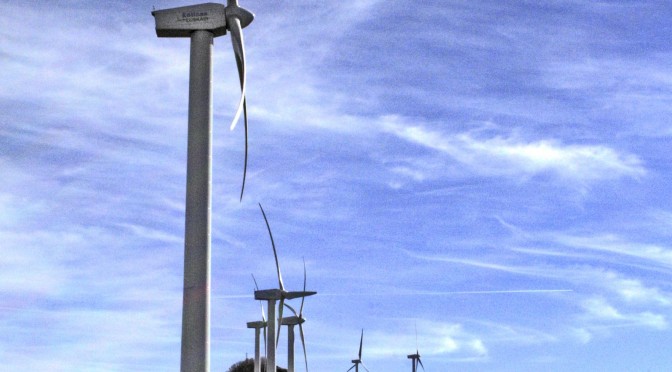In 1927, long before President Franklin Delano Roosevelt and his Rural Electrification Administration (REA) brought electricity to the countryside, Marcellus Jacobs from eastern Montana invented the three-bladed wind turbine for electricity production.
At night, the Jacobs family farm provided the best advertisement for the effectiveness of his new technology, basking alone in the glow of electric light against the dark night sky of Montana’s plains. By 1931, Marcellus and his brother Joe had founded “The Jacobs Wind Energy Company” and moved to Minneapolis to develop the business.
Had it not been for the REA, who knows where distributed renewable energy generation and the Jacobs Wind Energy Co. would be today? The Jacobs business model relied on rural farms that private utilities refused to serve, claiming they were unprofitable. When the REA provided tremendous subsides to electric cooperatives to serve rural areas, the Jacobs business model dried up. By 1952 almost all U.S. farms had electricity thanks to the REA, and by the late 1950s The Jacobs Wind Energy Co. filed for bankruptcy, having sold an estimated 50,000 wind turbines.
The Jacobses were clearly ahead of their time, but their idea was fundamentally sound. Wind passing over the landscape can provide us with many times the energy we need, if we can harness it cost-effectively.
The last 30 years have seen the realization of Marcellus Jacobs’ dream, with the cost of wind energy from modern turbines coming down by 90 percent since 1980. Prices have dropped so far, in fact, that today wind can out-compete fossil-fuel generation in many instances — especially when utilities seek long-term power contracts that the volatile fossil-fuel industry can’t sign without charging a heavy premium for what natural gas or coal might cost decades from now.
But the wind industry’s success is in part due to the wind energy production tax credit (PTC), a 2.2-cents-per-kilowatt-hour performance incentive that has driven innovation and operating experience in the still-emerging technology. Unfortunately, the PTC is set to expire this year unless Congress acts, possibly cutting out the legs under an industry that is beginning to realize its potential.
At home, abandoning the tax credit could prove disastrous. Modern wind energy operations didn’t get going in Montana until 2005, when the 135-megawatt Judith Gap project became our first wind farm. Since then, Montana has added nearly 500 megawatts of wind energy, 229 this year alone. There are many hundreds more megawatts of wind energy under development in the state, but developers will require tax certainty for companies to invest. Until then, billions of investment dollars and hundreds of jobs will be sidelined.
Thankfully, we Montanans seem to understand the value of affordable, home-grown, pollution-free energy. A recent bipartisan poll shows that 86 percent of Montana voters support the development of wind energy and 55 percent name it first when asked which sources they most want to encourage.
Our political leaders agree. In rare bipartisan unanimity, Sen. Baucus, Sen. Tester and Rep. Rehberg all support an extension of the tax credit for wind energy. And in a turn that took many Congress watchers by surprise, Sen. Baucus guided a bill out of his committee, and out of the gridlock gripping Washington, with large bipartisan support that includes a PTC extension. With his leadership, the bill is expected to pass the Senate when Congress returns from recess. Before an extension of the PTC can become law, it will also need to pass the House.
Franklin Delano Roosevelt had a bold vision for electricity on every family farm, and his vision paid off handsomely. Today, we need a new vision, one that envisions clean, limitless, affordable renewable energy and an electricity grid that can accommodate it. The PTC is part of achieving that vision.
With any luck, we Montanans can bring a little common sense to Washington and pass this clean energy driver for the nation. And if anyone asks why we care so much for wind energy, we can say because we invented it.
Call Sen. Baucus today and thank him for his leadership, like Montanans before him, in moving wind energy forward.
Jeff L. Fox is the Montana policy manger for Renewable Northwest Project, a nonprofit regional advocacy group that promotes the expansion of environmentally responsible renewable energy resources.


